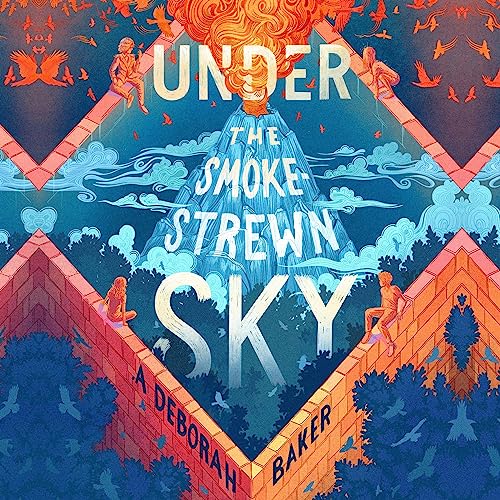 Under the Smokestrewn Sky (The Up-and-Under, #4) by A. Deborah Baker
Under the Smokestrewn Sky (The Up-and-Under, #4) by A. Deborah Baker Narrator: Heath Miller
Format: audiobook, eARC
Source: supplied by publisher via Edelweiss, supplied by publisher via Libro.fm
Formats available: hardcover, ebook, audiobook
Genres: fantasy, portal fantasy, young adult
Series: Up-and-Under #4
Pages: 195
Length: 4 hours and 48 minutes
Published by Macmillan Audio, Tordotcom on October 17, 2023
Purchasing Info: Author's Website, Publisher's Website, Amazon, Barnes & Noble, Kobo, Bookshop.org, Better World Books
Goodreads
The end of the improbable road.
Since stumbling from their world into the Up-and-Under, Avery and Zib have walked the improbable road across forests, seas, and skies, finding friends in the unlikeliest of places and enemies great in number, as they make their way toward the Impossible City in the hope of finding their way home.
But the final part of their journey is filled with danger and demise. Not everyone will make it through unscathed. Not everyone will make it through alive.
The final part of the enchanting Up and Under quartet reminds us of the value of friendship and the price one sometimes pays for straying from the path. No one’s safety can be guaranteed under the smokestrewn sky.
My Review:
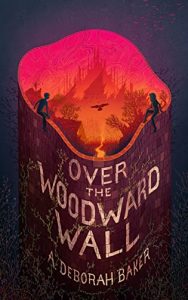 We have come, at last, to the final chapter of Zib and Avery’s journey into and hopefully through the Up-and-Under. It’s a journey that has taken them from their ordinary and mundane homes – even if Zib’s and Avery’s definitions of ordinary and mundane are entirely opposite to one another – and sent them along the Improbable Road on an equally improbable journey through every single one of the elemental kingdoms in the Up-and-Under.
We have come, at last, to the final chapter of Zib and Avery’s journey into and hopefully through the Up-and-Under. It’s a journey that has taken them from their ordinary and mundane homes – even if Zib’s and Avery’s definitions of ordinary and mundane are entirely opposite to one another – and sent them along the Improbable Road on an equally improbable journey through every single one of the elemental kingdoms in the Up-and-Under.
They’ve picked up friends along the way. And, even if they haven’t changed physically along their way, they’ve certainly changed quite a bit on the inside – just as they’ve changed the lands they pass through on the outside.
Even though, as their quest winds closer to its end, this particular part of their journey sees Avery backsliding rather a lot into the boy he was at the beginning. A boy who couldn’t quite wrap his logical and orderly mind around the immutable fact that the Up-and-Under was entirely mutable from beginning to end, that things absolutely did not work there the way they did back home in America. And that the way things did work in the Up-and-Under might not be what HE was used to, but just because things were done differently did not mean things were wrong or ridiculous.
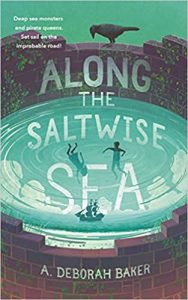 It’s Avery’s bit of stubborn backsliding that pushes the story off the Improbable Road and into their very last set of adventures in the Up-and-Under. Adventures that will have a much bigger impact than any of them imagined when they began.
It’s Avery’s bit of stubborn backsliding that pushes the story off the Improbable Road and into their very last set of adventures in the Up-and-Under. Adventures that will have a much bigger impact than any of them imagined when they began.
Because for every great change there are great consequences, and the time has come for someone to pay them. Whether or not anyone wins this last throw of the dice, someone is going to have to lose.
Escape Rating A-: I’ve enjoyed Zib and Avery’s journey through the Up-and-Under, so as a treat for this final entry in the series I decided to try it in audio. I still loved their story, but the audio wasn’t quite as much of a treat as I was hoping it would be.
The voice actor was terrific at differentiating the characters’ voices, but one of those characters is the voice of the narrator who is telling the story to us as the audience. Because of the nature of the series, that its protagonists are predominantly young adults or not quite that old the storyteller character took on an arch tone that arched so very high that it arced all the way over into condescension – which led me to switch to text at the halfway point. I liked the storyteller’s voice a LOT better inside my own head.
However, whether in text or in audio, Under the Smokestrewn Sky is the story that brings the journey through the Up-and-Under to its ending, and it’s a story full of surprises and costs and consequences – as it should be.
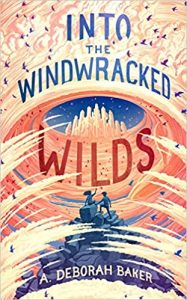 No matter the age of the protagonists, this has been the story of an epic fantasy quest that combines bits of Narnia with elements of Wonderland. Zib and Avery have been brought to the Up-and-Under to fix what’s gone wrong there, while for Zib and Avery the quest is to find their way home. It’s not going to end in a big battle between good and evil, because those concepts aren’t exactly the same in the Up-an-Under as they are back home. Instead, it’s a quest to put the out-of-balance back into balance – even if some of what they see looks like evil to Zib and Avery’s – especially Avery’s – eyes.
No matter the age of the protagonists, this has been the story of an epic fantasy quest that combines bits of Narnia with elements of Wonderland. Zib and Avery have been brought to the Up-and-Under to fix what’s gone wrong there, while for Zib and Avery the quest is to find their way home. It’s not going to end in a big battle between good and evil, because those concepts aren’t exactly the same in the Up-an-Under as they are back home. Instead, it’s a quest to put the out-of-balance back into balance – even if some of what they see looks like evil to Zib and Avery’s – especially Avery’s – eyes.
And, even though Zib and Avery are still children, this has been an adult journey which has to carry adult consequences for someone. A someone who might be either Avery or Zib – even if that doesn’t feel fair. Because part of the lesson Avery has to learn is that fairness doesn’t enter into the big answers to the big questions nearly as often as his life so far has led him to believe that it should.
Readers who started at the beginning of this journey in Over the Woodward Wall will probably not be surprised at how all the big questions that were asked at the beginning of the story get answered at its end. But following Zib’s and Avery’s journey to get there has been fantastic!

 Into the Riverlands (The Singing Hills Cycle, #3) by
Into the Riverlands (The Singing Hills Cycle, #3) by 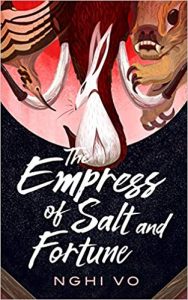 The entire
The entire 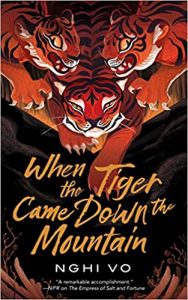 Escape Rating A+: At first, Into the Riverlands seems as if it’s a play on the Canterbury Tales, with Cleric Chih taking the place of Geoffrey Chaucer himself (who, come to think of it, by certain definitions was himself a ‘cleric’). Into the Riverlands is a journey, and every person in the party has at least one story to tell. It’s Chih’s duty to record those stories – not to become a part of one themselves.
Escape Rating A+: At first, Into the Riverlands seems as if it’s a play on the Canterbury Tales, with Cleric Chih taking the place of Geoffrey Chaucer himself (who, come to think of it, by certain definitions was himself a ‘cleric’). Into the Riverlands is a journey, and every person in the party has at least one story to tell. It’s Chih’s duty to record those stories – not to become a part of one themselves.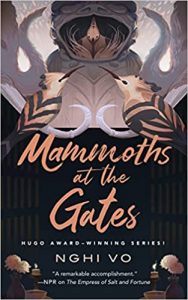 But, as I said in last week’s review of
But, as I said in last week’s review of 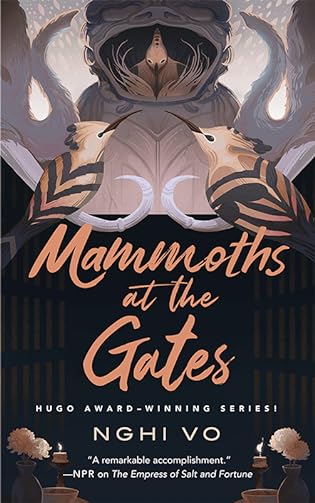 Mammoths at the Gates (The Singing Hills Cycle, #4) by
Mammoths at the Gates (The Singing Hills Cycle, #4) by  It’s also a heartbreakingly beautiful tale of a truth that sets no one free, and a love that both transcends and transforms death.
It’s also a heartbreakingly beautiful tale of a truth that sets no one free, and a love that both transcends and transforms death. Wild Spaces by
Wild Spaces by 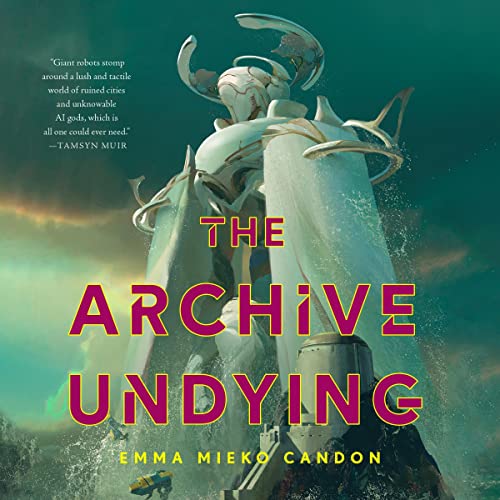 The Archive Undying (The Downworld Sequence, #1) by
The Archive Undying (The Downworld Sequence, #1) by 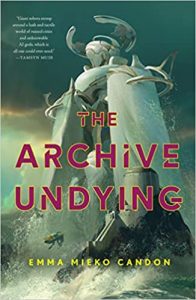 Escape Rating B: I listened to The Archive Undying in its entirety, and I have to say that its the narrator that carried me through all SIXTEEN AND A HALF HOURS. The narrator didn’t just do a good job of voicing all the many, many characters, but by literally being in their heads and not my own it allowed me to care enough about the individuals to be willing to experience the whole constantly twisting saga. If I’d been reading this as text, if I’d been in my head instead of theirs, I’d have DNF’d fairly early because the sheer number of changes in perspectives combined with unsatisfying hints of the world they occurred in would have driven me mad in short order. YMMV.
Escape Rating B: I listened to The Archive Undying in its entirety, and I have to say that its the narrator that carried me through all SIXTEEN AND A HALF HOURS. The narrator didn’t just do a good job of voicing all the many, many characters, but by literally being in their heads and not my own it allowed me to care enough about the individuals to be willing to experience the whole constantly twisting saga. If I’d been reading this as text, if I’d been in my head instead of theirs, I’d have DNF’d fairly early because the sheer number of changes in perspectives combined with unsatisfying hints of the world they occurred in would have driven me mad in short order. YMMV.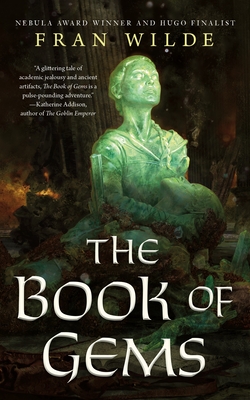 The Book of Gems (Gemworld, #3) by
The Book of Gems (Gemworld, #3) by 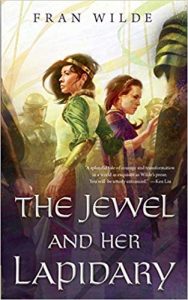 The Book of Gems is the third book in the
The Book of Gems is the third book in the 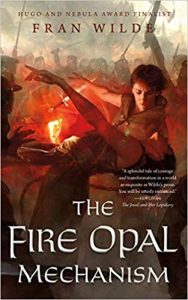 Escape Rating A-: I originally picked up
Escape Rating A-: I originally picked up 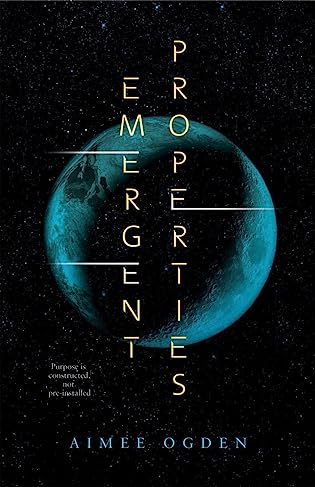 Emergent Properties by
Emergent Properties by 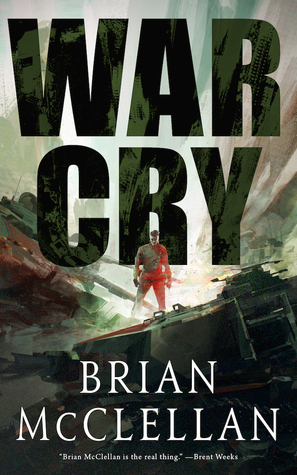 War Cry by
War Cry by 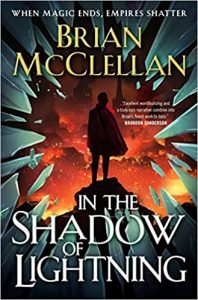 I picked this up because I adored the author’s
I picked this up because I adored the author’s 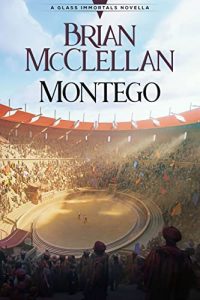 This turns out to be a story that embodies, not just Sherman’s “War is Hell” quote, but more especially a less often seen quote from G.K. Chesterton that goes, “The true soldier fights not because he hates what is in front of him, but because he loves what is behind him.” Or in the case of Teado and his company, because he loves what is beside him.
This turns out to be a story that embodies, not just Sherman’s “War is Hell” quote, but more especially a less often seen quote from G.K. Chesterton that goes, “The true soldier fights not because he hates what is in front of him, but because he loves what is behind him.” Or in the case of Teado and his company, because he loves what is beside him.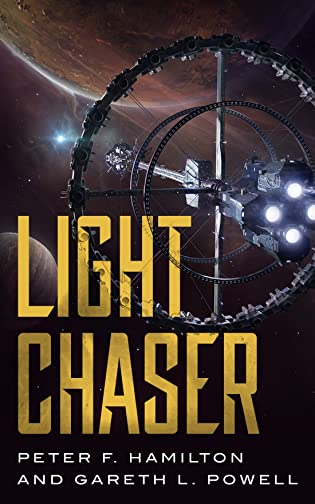 Light Chaser by
Light Chaser by 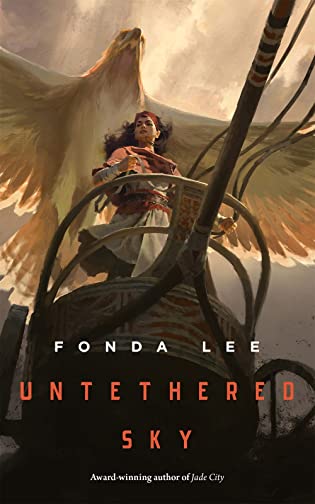 Untethered Sky by
Untethered Sky by 